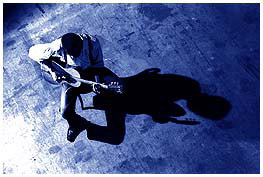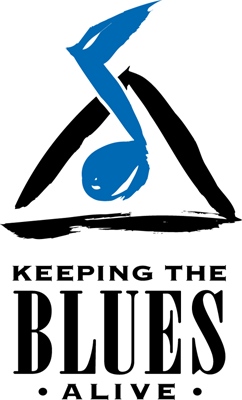
Johnson recorded 29 songs, most with two existing takes, in two sessions, both in Texas: November 1936 in San Antonio and June 1937 in Dallas. He performed alone on every cut, singing, and playing steel-stringed acoustic guitar with a bottleneck slide on one finger of his left hand. His first 78 rpm release, Terraplane Blues, became quite popular, but none of his subsequent releases would equal it in sales.
Also, Johnson had died just a year before he would have had the opportunity to appear in John Hammond's "Spirituals to Swing" concert in New York's Carnegie Hall (Benny Goodman's appearance there made him the "King of Swing"). Without knowlege of Johnson's passing, Hammond had been seeking him.
He became somewhat forgotten, until in 1961 an LP of Johnson songs called King of the Delta Blues Singers was released. This exposed him to a new audience of blues fans who already knew Muddy Waters, Howlin' Wolf, and other electric blues performers who had migrated to Chicago from the Delta; particularly a large number of white American and especially British listeners.
As evidenced by the title of the album, Johnson posthumously received the recognition he deserved, and Eric Clapton (Cream's version of Crossroads) and the Rolling Stones (a handful of covers, most notably Love in Vain), among others, paid him homage as a musical ancestor of rock'n'roll. His sound can be heard to some degree in almost all of the popular music created in America since his time.
Recently, the 2-CD set of his entire recorded output has been digitally remastered and released, with a comprehensive booklet and complete lyrics enclosed. Johnson stands out from other Delta musicians in that he learned not only personally from his local influences but also from an extraordinarily wide variety of styles on 78-rpm recordings, possibly including even Duke Ellington. As a result, his guitar playing exhibits a sophistication which made him capable of changing meters, riffing styles and tempos smoothly (many of his songs) or abruptly (Malted Milk Blues), as required by the moment, making his guitar almost like an orchestral commentary on the vocals.
His guitar parts have an astonishingly propulsive rhythmic drive, and in most of his songs they evoke to me the rhythms of the train. Eric Clapton said: "it really shook me up because...he didn't seem concerned with appeal at all...it didn't obey the rules of time or harmony or anything-he was just playing for himself." Johnson plays with such a heavy beat that it sounds like the train rolling across the tracks (at various tempos) while he sings the blues to himself or to his travelling buddy. And those vocals are every bit as complex as the early singing and playing of Louis Armostrong, maybe even more so [on Armstrong, see Sims 1987]. (There's also an interesting parallel here with Harry Partch, who was also riding freight trains and composing pieces about it, at about this same time.)
With completely independent bass line, two-part chording or high-string riffing, and expert vocals, it often seems as though there are two (or even three) performers on the records. Keith Richards wrote: "...I was hearing two guitars, and it took a long time to actually realize he was doing it all by himself."
On gigs, he played anything his audience would pay for, and this variety is reflected in his own recordings. Much of his subject-matter was also a variety of standard repertoire among his colleagues, such things as being broke, his woman leaving him, evil spirits, and rambling, and the majority of the songs contain sexual double entendre, which was very common-two great examples are Terraplane, using a car as a metaphor for his woman, and Phonograph Blues, invoking a record-player in a similar manner. But Johnson also wrote and sang about much more personal material, such as impotence (in at least three songs, Dead Shrimp Blues, Milcow's Calf Blues, and the great Stones in My Passway).
The consensus about Johnson's recordings is that the best songs evoke emotions so powerful as to rarely be attained in musical performance. In particular, when he sang the common macho blues boast about being in league with the Devil, he made it sound so convincing that it's scary-his masterpiece Hell Hound On My Trail is the best of all, and If I Had Possession Over Judgment Day,Me And The Devil Blues, and Preachin' Blues(Up Jumped The Devil) are almost as chilling. Robert Johnson is a Bluesman of legend. Many have heard the name, and know of the Blues crossroads legend, but have never heard his music, or at least do not attribute it to him.
Robert Johnson went down to the crossroad . . . where they say he struck a deal with the Devil. Fellow bluesman Tommy Johnson said, "If you want to learn how to play anything you want to play and learn how to make songs yourself, you take your guitar and you go to where a road crosses that way, where a crossroad is. Get there, be sure to get there just a little 'fore 12:00 that night so you'll know you'll be there. You have your guitar and be playing a piece there by yourself. . . . A big black man will walk up there and take your guitar, and he'll tune it. And then he'll play a piece and hand it back to you. That's the way I learned to play anything I want." (As told by LeDell Johnson to David Evans and quoted from Peter Guralnick's Searching for Robert Johnson, copyright © 1982, 1989.)
In 1936 and 1937, Robert Johnson recorded such immortal blues classics as I Believe I'll Dust My Broom, Sweet Home Chicago, Come On In My Kitchen, Cross Road Blues, Traveling Riverside Blues, Love In Vain, Hellhound On My Trail, and Me And The Devil Blues. Johnson was born in Hazelhurst, Mississippi, in 1911 and died under still-mysterious circumstances near Greenwood, Mississippi, in 1938.

